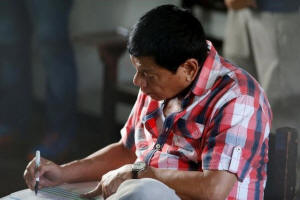|
Philippines' election victor Duterte
plans government overhaul
 Send a link to a friend
Send a link to a friend
[May 10, 2016]
By Neil Jerome Morales
DAVAO, Philippines (Reuters) - The
Philippines' president-elect, rough-talking city mayor Rodrigo Duterte,
announced plans on Tuesday for an overhaul of the country's system of
government that would devolve power from "imperial Manila" to
long-neglected provinces.
|

Presidential candidate Rodrigo "Digong" Duterte casts his vote at a
polling precinct for national elections at Daniel Aguinaldo National
High School in Davao city in southern Philippines, May 9, 2016.
REUTERS/Erik De Castro |
|
 Duterte's win in Monday's poll has not been confirmed, but an
unofficial count of votes by an election commission-accredited
watchdog showed he had a huge lead over his two closest rivals, both
of whom conceded defeat. Duterte's win in Monday's poll has not been confirmed, but an
unofficial count of votes by an election commission-accredited
watchdog showed he had a huge lead over his two closest rivals, both
of whom conceded defeat.
By Tuesday afternoon, the ballot count showed Duterte had almost 39
percent of votes cast. He was more than 6 million votes ahead of the
second-placed candidate with 92 percent of votes counted from an
electorate of 54 million.
It is not clear when Duterte's victory will be officially declared
but he is expected to take office on June 30.
Votes were also cast on Monday for vice-president. One day on,
counting showed the outgoing administration's candidate, Maria
Leonor Robredo, ahead of the son and namesake of late dictator
Ferdinand Marcos.
Duterte's spokesman, Peter Lavina, told a news conference that the
new president would seek a national consensus for a revision of the
constitution which would switch from a unitary form of government to
a parliamentary and federal model.
The proposal to devolve power from Manila fits with Duterte's
challenge as a political outsider to the country's establishment,
which he has slammed as self-serving and corrupt.
"The powerful elites in Manila who will be affected by this system
will definitely oppose this proposal," said Earl Parreno, an analyst
at the Institute for Political and Electoral Reforms.
 Duterte's spokesman said he would also seek peace agreements with
rebel groups in the south of the archipelago, where the outgoing
government has been using force to quell militancy.
The 71-year-old's truculent defiance of political tradition has
drawn comparisons with U.S. Republican presidential candidate Donald
Trump, as have his references to his libido.
That tapped into popular disgust with the ruling class over its
failure to reduce poverty and inequality despite several years of
robust economic growth.
SOUTH CHINA SEA TALKS
Duterte's vows to restore law and order also resonated with voters.
But his incendiary rhetoric and advocacy of extrajudicial killings
to stamp out crime and drugs have alarmed many who hear echoes of
the country's authoritarian past.
U.S. Assistant Secretary of State for East Asia and the Pacific
Daniel Russel told reporters in Vietnam that Washington respected
the choice of the Philippine people and "will gladly work with the
leader that they select".
Duterte made a succession of winding, bellicose and at-times comical
remarks late on Monday as the votes were being counted, venting over
corruption and bad governance and telling anecdotes from his 22
years as mayor of Davao city.
Wearing a casual checked shirt and slouched in a chair, he said
corrupt officials should "retire or die" and reiterated his support
for police to use deadly force against criminals.
"I'll behave if I become president," he said, adding that he would
not make state visits to countries with cold weather.
[to top of second column] |

In an early indication of his unorthodoxy, Duterte told reporters on
Monday that if he became president he would seek multilateral talks
to resolve disputes over the South China Sea.
The outgoing administration of President Benigno Aquino has asked a
court of arbitration in The Hague to recognize its right to exploit
waters in the South China Sea, a case it hoped could bolster claims
by other countries against China in the resource-rich waters.
Duterte said negotiations should include Japan, Australia and the
United States, which is traditionally the region's dominant security
player and contests China's development of islands and rocky
outcrops in the sea.
The influential Chinese state-run tabloid the Global Times, said
that Beijing would not be naive enough to believe that a new
president would bring a solution to the South China Sea disputes.
"Only time will tell how far the new leader, be it Duterte or not,
will go toward restoring the bilateral relationship."
FIGHTING THE ESTABLISHMENT
Duterte's entertaining and profanity-loaded speeches have shed
little light on his policies beyond going after gangsters and drug
pushers.
He has been vague on what he would do to spur an economy that has
averaged growth at around 6 percent under Aquino.
Duterte said on Monday he had been criticized for not discussing
policy but would "hire the best economic minds".
One of his advisers told Reuters spending on education would be
lifted to benefit "disadvantaged regions" and rural development will
be prioritized to spread wealth more evenly across the country.
"Everything seems to be in imperial Manila," said Ernesto Pernia,
professor emeritus of economics at the University of the
Philippines. "He wants to give more attention to the lagging, the
backward regions."

Pernia said the pursuit of tax evaders and corrupt officials should
bolster government revenues to fund extra spending.
(Additional reporting by Manuel Mogato in MANILA and My Pham in
HANOI; Writing by John Chalmers; editing by Robert Birsel)
[© 2016 Thomson Reuters. All rights
reserved.]
Copyright 2016 Reuters. All rights reserved. This material may not be published,
broadcast, rewritten or redistributed. |